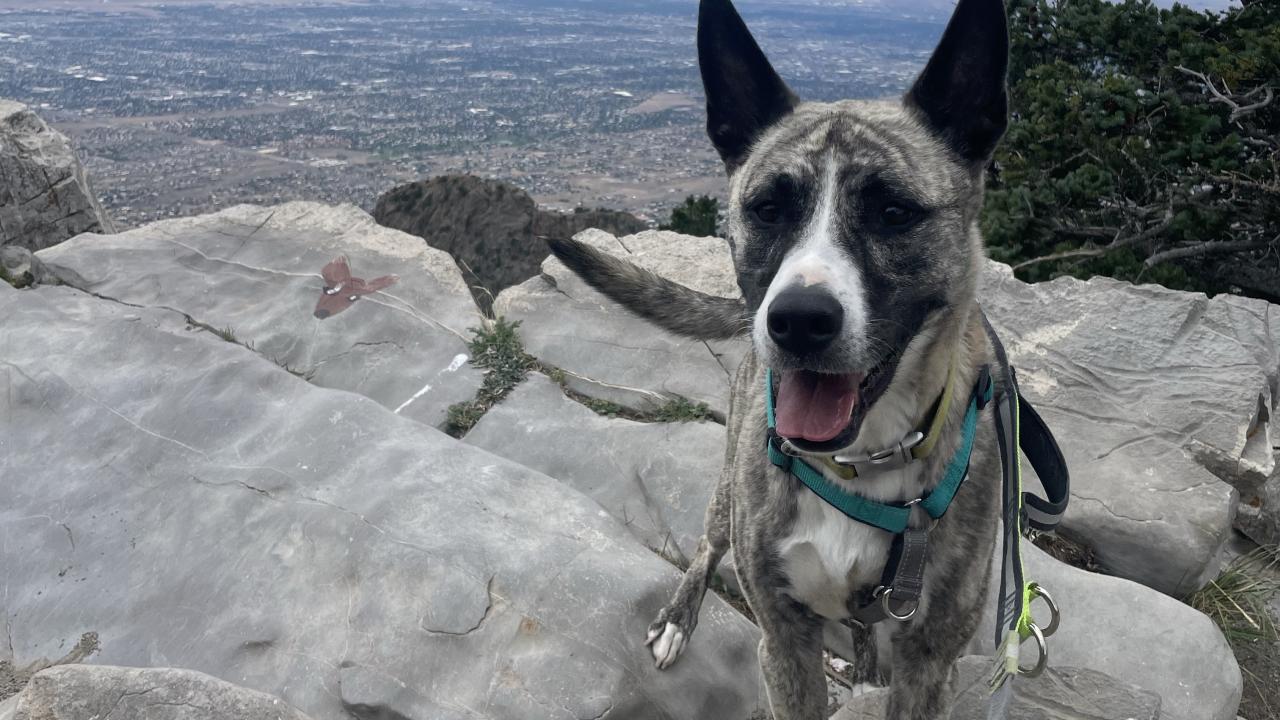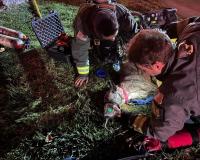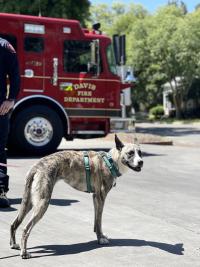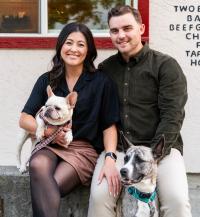
Dog Survives Carbon Monoxide Poisoning from House Fire
“Case of the Month” – May 2024

Dr. Allison O'Donnell is familiar with the UC Davis veterinary hospital, having received her veterinary degree from the school in 2023. Unfortunately, she and fiancé Matt Cardinale had to experience the hospital as clients recently when their dog Squid, a 5-year-old female husky/terrier mix, was trapped in a house fire and suffered carbon monoxide poisoning.
Both Dr. O’Donnell and Cardinale were away from home when their Davis house caught fire on April 12. An alarm system alerted Cardinale, who promptly called a neighbor who found one of their four animals, French bulldog Bella, just inside the front door. Two cats—Tina and Temple—and Squid were unaccounted for.
Firefighters with the City of Davis Fire Department found Squid in the room where the fire started and provided her oxygen therapy at the scene. They also found Tina and contacted Yolo County Animal Control to take them to UC Davis. Tina was quickly released after not suffering any harm, and firefighters later found Temple unharmed hiding in another part of the house that wasn’t damaged.
Squid was not so lucky.
Being trapped near the fire, Squid was overcome by smoke inhalation, and her condition quickly deteriorated.
Dr. O’Donnell arrived at the veterinary hospital just as Animal Control was bringing in Squid.
“I saw the Animal Control officer carrying her in, and Squid looked just awful,” said Dr. O’Donnell. “She didn’t respond to me at all. I thought she was going to die.”

Squid was brought straight to the Emergency Room, where she was immediately placed on oxygen. The carbon monoxide poisoning resulted in extremely low levels of oxygen in her blood and there were concerns that smoke inhalation had impaired her lung function.
“I can’t emphasize enough how important the firefighters were to Squid's survival to this point,” said board-certified emergency specialist Dr. Kate Hopper upon Squid’s arrival at the ER. “The oxygen she received at the scene was likely lifesaving.”
Sadly, Squid’s respiratory status continued to decline in the ER. Dr. Hopper was concerned that Squid, now oxygen dependent, could potentially become unresponsive to oxygen therapy if her lung injuries progressed.
“Unfortunately, it is very hard to predict how smoke inhalation cases will progress,” said Dr. Hopper as Squid fought for her life. “Only time will tell.”
Squid developed swelling.in her throat and nasal cavity from inhaling hot ash in the fire. Dr. Hopper warned Squid’s family that a tracheotomy may be necessary to help her breathe, but steroids helped bring the inflammation down, and Squid responded well to oxygen therapy throughout the night.
Things took a positive turn in the morning, as she appeared bright and responsive for the first time since being hospitalized.
“She perked up when she saw Matt that morning,” said Dr. O’Donnell, emphasizing the special bond the two have.
On the third day, Squid was weaned off oxygen and was comfortable breathing room air.

As Squid’s healing progressed, specialists from ophthalmology, cardiology, and neurology were brought in to assess Squid’s systemic conditions. Thankfully, her heart was in good condition, but the fire did cause corneal ulcers in Squid’s eyes as a result of the hot smoke and ash in the fire. Ophthalmologists were able to successfully treat them with topical medications.
The neurology consultation discovered the development of a slight head tremor, which is known to happen to both humans and animals after carbon monoxide poisoning. While Squid’s head tremor was resolved, she developed a slight abnormality in her gait. Research into the condition shows that nearly half of dogs that survive carbon monoxide poisoning walk differently for the rest of their lives.
Squid continued to show improvement and was discharged after five days. Dr. O’Donnell monitors her closely with the help of her colleagues at VCA Loomis Basin Veterinary Clinic, where she is completing a required one-year internship before starting a three-year residency in emergency and critical care at the University of Pennsylvania.
Dr. O’Donnell reports that Squid is still not 100% recovered, but she is making progress every day. She expects Squid to be fine by the time they make the move to Philadelphia later this summer.
# # #

(photo courtesy of City of Davis Fire Department Facebook page)
